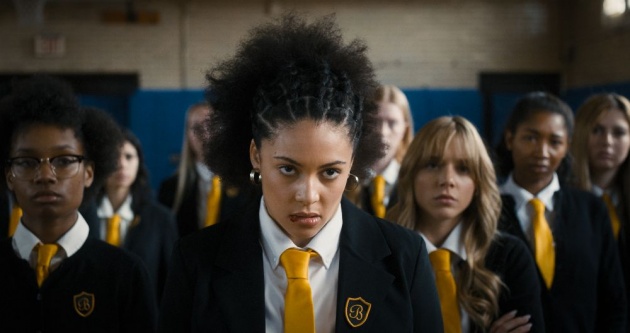
Pictured: Ready to sting as a Berwick Bee, Jonquil (Kiah McKirnan, centre) in a scene from the subversive horror film, 'Perpetrator', written and directed by Jennifer Reeder. Still courtesy of Shudder
When is a horror movie not a horror movie? When it deliberately avoids scaring the audience. Perpetrator, an American film written and directed by Jennifer Reeder set to be released on the subscription channel Shudder, has plenty of blood, implements of torture, disappeared girls, metamorphoses of different types – the shuddering face effect is a clue that something is going on – and a high school, coming-of-age setting (the protagonist’s 18th birthday has a heightened significance) but for long stretches plays like a knowing riff on the genre. You watch it not with impending dread but with impatience. Reeder isn’t creating and manipulating expectations in the way that other directors do, although we have some suspicions of who the perpetrator is. Rather, with incessant but barely commented upon nose bleeds – at least two characters resemble Jack Nicholson’s JJ Gittes post-knife wound look in Chinatown – it reproduces horror tropes without the thrill, including that stock post-Halloween staple, the point of view shot from a masked assailant. There’s a Final Girl too, though she’s not exactly Final.
I would associate Reeder’s work here with compatriot writer-director Amanda Kramer (Please Baby Please). Both play with genre with a knowing wink, breaking down what we might expect. Both directors also employee a former icon from 1990s Hollywood. In Kramer’s case, it was Demi Moore. In Reeder’s, it’s Alicia Silverstone. Silverstone has the added pleasure of being the only recognisable name in the cast, though she herself looks nothing like her 1990s Clueless self – and why should she? The pleasure comes from Reeder addressing a taboo – giving work to the stars that Hollywood forgot.
Perpetrator opens with a montage of medical instruments and blood splatters punctuated by bursts of over exposure of the image. It is followed by a shot from the point of view of a masked character. The title sequence plays like a mood board, though it does establish the theme, if not the tone, of the ensuing drama. Reeder then repeats the stalking point of view short of a young woman with blonde hair shown from behind. She looks frantically back behind her. She then takes a good look at the unseen person following her with something akin to familiarity. ‘Oh, what are you doing out here?’ she asks. We then have the sense that something very bad is happening. At no point in this sequence is the body of the young woman objectified – we just see her head and shoulders. Reeder removes the reading of the encounter as a substitute rape scene vicariously enjoyed by the (male) audience. As to what happens to the young woman – we see her an oxygen mask placed over her face by a masked man who then applies the same oxygen mask to his own face and gets high on it. Not so much Blue Velvet but Palma Violets – kids’ stuff.
Cut to another hand-held point-of-view from behind our protagonist, Jonquil (Kiah McKirnan), who is attempting to open the door of a car. The shot initially places her in danger – we expect point-of-view shots to belong to someone – though she is in fact the perpetrator of the title, breaking into vehicles and, as we see later, homes. Jonquil is bi-racial. There is a growing trend in horror films, such as The Invitation, to feature lighter-skinned, neither white nor black protagonists. We can read the character’s skin colour as an expression of her outsider status, caught between two worlds, and as exotic, also as a statement of racial evolution. If we are all bi-racial, we then cannot use skin colour as a form of prejudice. We cannot initially place Jonquil, referred to as Jonny, as a seventeen-year-old high school student. We discover that her larceny is driven by social deprivation. Her mother has disappeared. She is raised by her white dad who has a medical issue. Having failed to open a car door, she beelines for a house and demonstrates – through the convention of jump-cuts – an ability to open a Yale lock. Inside she wanders around proprietorially, looking at herself in the mirror, helping herself to meds, before divesting a jewellery box of its contents, taking cash out of a jacket pocket, and stuffing a skimpy lamé dress into her bag. She is interrupted for the sake of dramatic tension by a noise before slipping out the front door.
Jonquil then beelines for another car (busy night). Inside there is her fence (slang: individual who purchases stolen goods and then disposes of them for a profit). ‘What you got?’ he asks, getting to the point because fences are not interested in the social lives of young biracial women. Jonquil offers him pearls in exchange for uncounted bank notes. ‘I need more. I’m getting out of here,’ Jonquil explains. ‘What else?’ the fence asks. Jonquil naturally holds out. The fence knows it before exercising the male weakness for barely persuasive violence.
Jonquil then heads home, handing cash and the meds to her father. He has payments to make and an inability (without Jonquil’s help) to honour them. Jonquil stuffs a bunch of clothes into her bag before she is interrupted. ‘You gave me too much’, her father tells her. ‘You want pizza?’ The two of them sit in front of the television eating freshly delivered pizza. The film which we hear but not see seems made up, or else is Shudder/AMC content. Dad is on a sofa, pizza box next to him. Jonquil is on the floor. Dad points a finger at Jonquil’s head and gestures to pull the trigger. He then points to his own head and does the same. Transfixed by TV, Jonquil is oblivious to her father.

Pictured: 'You stole it, you eat it.' Aunt Hildie (Alicia Silverstone) in a scene from the American subversive horror film, 'Perpetrator', written and directed by Jennifer Reeder. Still courtesy of Shudder
After taking his meds – cue a facial shudder - Dad calls Jonquil’s aunt, Hildie (Silverstone), who offers to look after Jonquil. When Hildie opens the door, some of the audience murmured pleasurably. Silverstone’s features have hardened with maturity – there is no hint of youthful perkiness. Hard-won Hollywood tenacity is something to cheer and also, it must be said, something to get over; we should allow American actresses to grow old on screen just like their male counterparts. Hildie is happy to welcome Jonquil. She has something in mind – an 18th birthday cake with an extra special ingredient, bloody to the touch. (Practical effects, take a bow.) Hildie is also critical of Jonquil’s larceny, going into her room and presenting Jonquil with stolen things. Jonquil is invited to eat one of the things she has taken. She chooses the lipstick.
New neighbourhood means new school. Jonquil joins the home of the Berwick Bees. She looks through the gym door window at some girls practicing. A young man, Kirk (Sasha Kuznetsov) appears from behind. ‘The blonde is mine,’ he tells Jonquil semi-mysteriously, referring to Aviva (Casimire Jollette). ‘You can have any of the others.’ We learn that in the neighbourhood a number of young women have disappeared. The school principal (Christopher Lowell, previously seen in Promising Young Woman) trains the young women in the class in surviving school shootings, a scene milked for dark comedy; Reeder’s humour doesn’t induce guffaws, but you welcome the attempt. Jonquil is standing up in one classroom, not joining in, while three classmates, including Aviva, cower under a table. ‘Get down,’ she is told, ‘You’ll get us killed.’ Jonquil isn’t into the drill. The principal appears and squirts all four of them with red dye, chastising them for their lack of preparedness. ‘The last time I was killed, I was grounded for a week,’ complains one classmate. Jonquil has a plan – to steal the record of who was killed, alter it, and spare her three classmates. Of course, she’ll need money. The classmates agree. Turning a school shooting into a cash cow? Jonquil is all-American.
Before then, Jonquil makes a new friend, Elektra (Ireon Roach) whom she first witnesses vomiting into a toilet bowl – the default starting point for all meet-cute romances. It isn’t long (in screen terms at least) before Jonquil and Elektra make out under a bedsheet, the film’s intimacy adviser distinguishing herself with sensitivity. To underscore the point, at no point are women’s bodies eroticised, Reeder demonstrating that there is another way.
There is a lot of fake blood on screen, from characters’ frequent nose bleeds to menstrual blood seen appearing through stockings. At one point, the blood seems to have a slurping life of its own. For a long time, the audience waits for something of substance to happen. Gory horror films have primed audiences for a killing every fifteen to twenty minutes, as well as the escalating, what-the-heck event. There is no such pacing to Perpetrator. What we have instead is a creepy school nurse, Marcy (Audrey Francis) who wears a plaster over her nose – a prop (with trailing threads) that draws the eye. Marcy asks if Jonquil is having her period. ‘It started today?’ ‘Are you sexually active’ asks Marcy. ‘What do you mean?’ asks Jonquil, daring the nurse, who we sense may be sexually repressed herself, to be specific. Marcy replies. The scene, a battle of wills, ends with Jonquil receiving some meds. Those who cannot do, dispense.
The first half of the film is, sadly, sleep inducing, so I missed Jonquil’s transformation and learning about ‘forevering’. It does however get better. Jonquil enlists Elektra’s aid in tracking down the kidnapper. We learn that Kirk is connected to all four disappearances. There is a creepy cop who also has a plaster over his nose. There is a connection between him and another character. Jonquil receives a ride home and Reeder delivers the film’s sole jump scare.
Jonquil has the ability to read the minds of those around her and speak their words. Her face also appears to change in appearance – the film’s lighting and digital effects department put in a shift. The serial kidnapper is also trying to achieve a transformative of sorts, with a pipe that leads from his body into his victims.
As the film starts to click, Reeder achieves something quite radical – presenting a serial killer-type who is more comical than menacing. Reeder doesn’t want to perpetuate a culture of fear of and fascination with those in the serial killing business. She might as well be presenting the killer as the third Wet Bandit (see Home Alone). The last part of the film is more action-orientated – Jonquil makes use of her boots. The film then has a long series of final scenes. There is also a second sequence where Jonquil encounters a group of young women in hiding – recalling the comical school shooting drill. There is a mattress that swallows and action that takes place in an ocean of blood – filmed in an underwater tank with red-tinting.
Jonquil makes a surprising discovery about her mother and there are multiple ‘final’ scenes. We are left, strangely, with the image of vampire teeth. Jonquil’s power is shared by another character who can make Jonquil bite her tongue. Resistance to the kidnapper is also met with tongue removal.
Perpetrator elicited some laughter from the late evening screening crowd but is more unpleasurable than a fun ride. Jonquil doesn’t solve her father’s economic problems, but the issue is displaced by something else. There is a speech on the pleasure of not being looked at and having to fend off unwanted touches that suggests why, given the option, gender transitioning is seen as a response to male behaviour. This takes the film into a whole other area.
Are men born perpetrators, destined only to subjugate women? Reeder isn’t explicit. There aren’t any good male role models in the film – either they are responsible for subjugation or look the other way – suggesting that perhaps they are biologically programmed to subjugate. There isn’t a strong female voice either. At the end of a long sequence of ‘final’ scenes, a human heart is put to use, eagerly feasted upon. Is this a sign of cynicism?

Reviewed at Berlin International Filmfestspiele, Panorama Section, Friday 24 February 2023, Cine Star Cubix Screen 8, Berlin Alexanderplatz, 21:45 screening



